Caregiving life is like a merry-go-round sometimes. We find ourselves circling around the same scenery and routines, feeling like we’re not really going anywhere. Life feels like crazy chaos while also seeming like a grueling slog going nowhere.
Let’s be honest, the nature of the exceptional needs in our households often interrupts or derails plans. For many of us, our former way of living must be entirely set aside for a new pace of life. And that “rhythm” can be tedious. It can be devastating to productivity and dreams.
And yet! New pacing and rhythms can also be among the greatest gifts that disability, chronic medical issues, or other special needs bring to life.
While visiting with Carly’s sleep specialist many years ago, we were discussing the infuriating cycle of getting encouraging results from a new medication only to find that the benefits would last a few nights or weeks, then disappear altogether. He referred to the situation as a “medication merry-go-round.” He encouraged us not to lose hope, explaining the potential benefits of taking a break and revisiting past options at some point in the future. Something that quit working earlier might give Carly different benefits later on. Despite that ray of hope, the merry-go-round analogy didn’t feel positive. It conjured awareness of the relentlessness of disability.
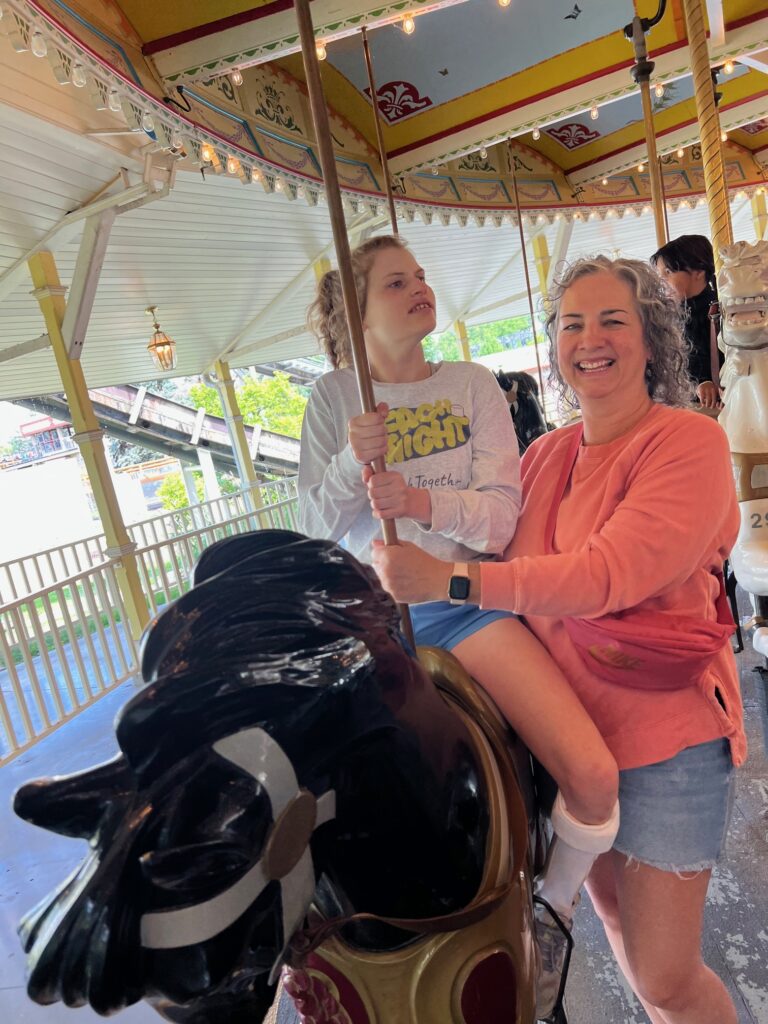
Thankfully, there is another kind of merry-go-round I have grown to love. It’s those theme park rides that slow down time and put a spotlight on the most precious things about disability — the simpler things like the joy sparked by movement, smiles, and just being together. For those moments, I am grateful for what breaks me away from my usual mental, emotional, and logistical attachments to delight anew with my youngest daughter and the rest of our family.
The picture shows Carly and I at Valleyfair, where we’re both embracing one of her favorite spots at the theme park with the family.
My friend Anthony Peterson recently shared about how highly he valued the impact slowing down had on his relationships with his son, Lewis. Lewis passed away on January 28th, 2024. So, this special needs dad’s reflection is poignant reminder about parenting with deliberate values and no regrets.
“Slow-living activities with Lewis were some of my most favorite moments being his father. Often, I said that Lewis was perfectly paired with me as many of the things we loved to do intertwined. He would sit in my lap for hours on end and we would watch Star Wars and Marvel, building Lego. I would put the Lego pieces in his hand and we would do the elaborate builds. It was a great time for Lewis and me to bond. It helped me enter into his world and listen to him — feeling his body movements, hearing his breathing, feeling his breathing, knowing him deeply.
Anthony Peterson
While non-verbal and unable to pick up the bricks himself, or look at the pages, or read the captions in Star Wars language, it was an extremely intimate way for my son and I to bond. It was a form of occupational therapy that was second to none! It was also a chance to serve my wife. I would come upstairs after work and hold Lewis immediately so she could do many of the things that had been waiting until the end of the day. Sometimes she would just take time to hold our daughter.
We did this so much that the lumbar support on the recliner got broken down. I had to move it downstairs after his passing because I couldn’t sit it in anymore. To have a chair molded to two people is something extremely special and has created lasted memories for me to fondly thing back on.
While I would refer to caring for Lewis as my second job on many occasions, it was a chance for me to stop, rest, care for my dear boy, care for my family, and even care for myself. Little did I know how much I was learning and how much I was grateful for those moments I got to stop, hold him, and just build Lego.”
I recently asked the WRIM community:
What is one of your favorite slow-living activities, and what do you enjoy most about it?
I think you will find their responses are encouraging and meaningful reminders to value and prioritize slow living.
At 10 years old, not many boys would desire to sit down and read books with their parents. However Judah loves it, so we have a lot of fun just sitting and reading board books with silly voices over & over together. It slows us all down, and helps us appreciate the simplicity of the moment. —Amie
[Our son] Connor loves music, but he gets overwhelmed by large crowds, so we enjoy attending local outdoor concerts. We take our chairs to set up then sit back and enjoy the show. It’s even better when friends and family members join us. For someone who doesn’t talk, he is a very social creature. He enjoys people watching before the show starts and sometimes during the show as well. It’s a great way to relax on a warm Summer day. —Ted
Stopping whatever I am doing (within reason) , and play when my child asks. Also, being completely and 100% intentional and focused on that activity with him. —Kelley
Being careful and intentional to pray with/ for/ over Joshua. When we stop and run to Jesus we acknowledge our utter dependence on Him, then we sense His presence, relax into His care and rest in His yoke no matter how intensely crazy the moments may be. It just takes us a few moments to be still and know God is carrying us. —Rebecca
I think that waiting is also a really good thing for slowing down and I praise God for Metro Mobility the transportation I use because sometimes I have to wait for a long time for the bus to come or just that the bus picks up other people and takes a long time to get places. It’s a good way to just kind of be silent for a while. —Maureen
My favorite slow-living activity is not using my phone for an afternoon. I enjoy it because I can just be, and be in the moment with my wife and kids. Another is curling up on the couch with Kelley and watching old classic movies. —Chris
When we are exploring new parks. We take the time to appreciate nature and what God has given us. Using all our senses to enjoy the moment, our sight to enjoy the plants and the animals we see. Our hands and feet to feel the different textures of the things they pick up as we walk (sticks, rocks, leaves, flowers). Our sense of smell as it’s changes when we walk on a path through the woods or near a creek or a pond. Our ears to hear the different sounds and learning to identify what we hear. Not everyone experiences all these things and we also experience them at different levels. Having myself and three kids with varying degrees of hearing loss in only one ear, we experience sounds differently. My son and I with our eyes and needing glasses we experience sight differently if we aren’t wearing our glasses. It makes me pause and express gratitude for the things we can experience and that we can experience them differently from each other. —Amy
I think that waiting is also a really good thing for slowing down and I praise God for Metro Mobility the transportation I use because sometimes I have to wait for a long time for the bus to come or just that the bus picks up other people and takes a long time to get places. It’s a good way to just kind of be silent for a while. —Maureen
Face-to-face time with Lewis and discussing matters with him. It slows me down and we connect on a deeper level. —Charlotte
Embracing the many music-making toys we own, by dancing to the music with Judah, whenever he pushes the buttons. I know some parents are eager to get rid of the noise making toys, but it’s a fun way to connect with Judah —and boy does he love pushing those buttons! — Amie
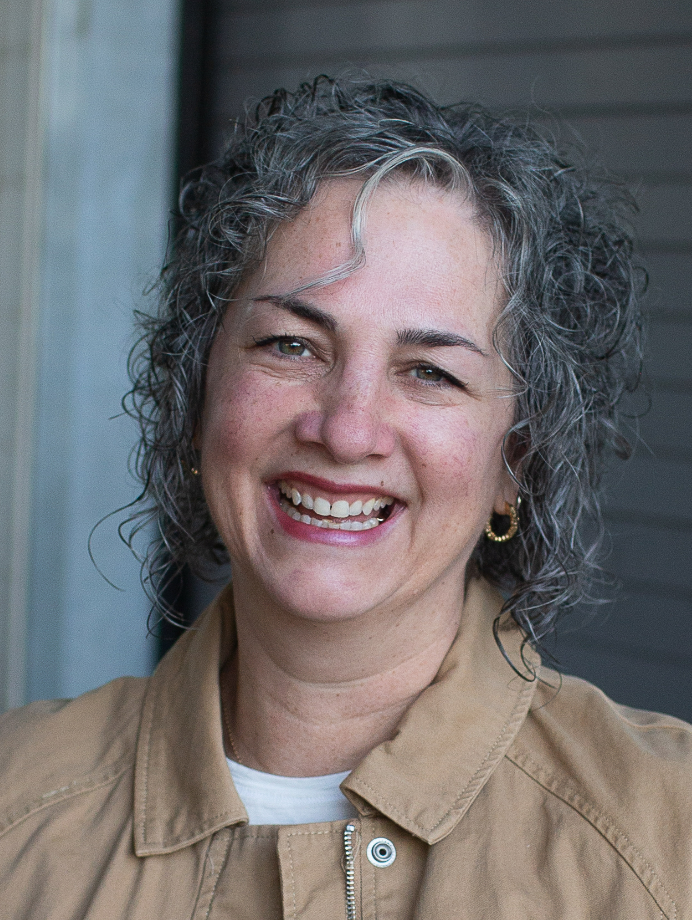
Lisa Jamieson is an author, speaker, special needs family advocate, and ordained pastoral counselor. She is co-founder of Walk Right In Ministries where she trains and counsels family caregivers to walk abundantly in life, faith, and relationships. Lisa and her husband, Larry, live in Minnesota with the youngest of their three grown daughters, Carly, who has Angelman Syndrome.




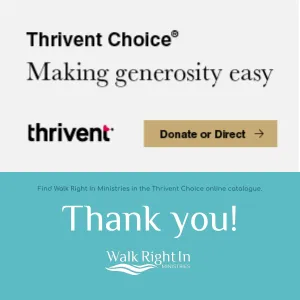


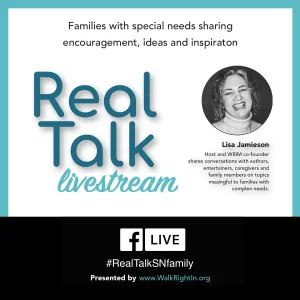
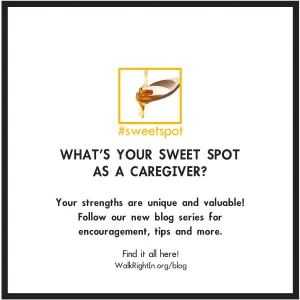

0 Comments